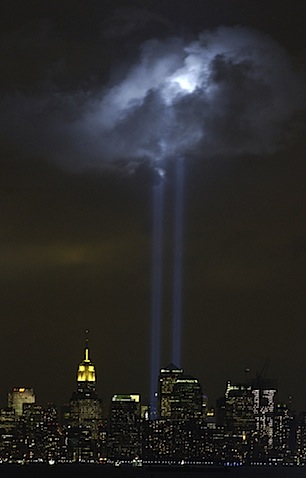(This story was originally posted in September of 2009, and is slightly revised here.)
You will read many stories today recounting the heroism and the losses experienced nine years ago. We know now how many individuals and organizations rose up to help victims of the WTC & Pentagon attacks, and how individually and collectively our responses to the 9/11 tragedy revealed important goodness deep within us.
Every year at this time my friends, neighbors, and I remember who we lost, and what we lost, on 9/11. (I live just outside NYC in a community hit hard by the WTC attacks.) Some of us lost big things – best friends, family, colleagues, organizations. Others lost smaller things, like briefcases, laptops, and family photos.
 What I want to share today is the story of how two different organizations – business schools- responded to a 9/11 loss experienced by one of their alumni.
What I want to share today is the story of how two different organizations – business schools- responded to a 9/11 loss experienced by one of their alumni.
A small-ish material loss
On 9/11, this alumnus lost many important people whom he could never replace. He lost a large part of a job and an organization he loved.
He also lost some material things, among them his business school diplomas. They hung on the wall of his office in one of the towers, and were destroyed in the attacks.
A few months after 9/11, when this alumnus was moving back into a new office, he decided he wanted to replace his diplomas. He contacted the two business schools where he got his BBA and his MBA, told them how he lost his diplomas, and asked if he could get replacement diplomas.
Two different responses
How these two different business schools responded to his request for replacement diplomas tell us something interesting about the values of each school.
School #1 showed that they cared about his loss.
School #1, where this alumnus got his BBA, went to great lengths to replace the diploma with something as close to the ‘real’ thing as possible.
Not only did the business school print a diploma with the correct names and dates, but also this school tracked down both the Dean of the Business School and the University President who had signed the original diploma. (Both of these men had moved on to other positions). This alumnus got a replacement diploma signed by the academics who led the school while he was a student there. And, they sent the diploma to him in an elegant frame.
School #2 showed something else.
School #2, where this graduate got his MBA, responded differently. When they made diplomas for the spring graduating class, they printed and signed an ‘extra one’ and sent it to the alum.
A few weeks later, they also sent him a bill for around $200. To pay for replacing the diploma destroyed on 9/11.
True values showed through
Can you imagine which diploma has more positive meaning to this alumnus now?
My bet is that it’s the diploma of the school that actually cared about him. The school that recognized his greater losses and his lesser material losses, and tried in its own way to help him with both.
And a reflection
This story is true, and it in no way captures the depth or meaning of this alum’s loss.

This particular piece of this person’s experience is almost trivial when held next to other losses and other responses that this person and others experienced that day. For this reason I alone wondered whether to share the story.
Also, I know from my own experience that the closer a person was and is to this tragedy, the less likely you can imagine or predict how it feels now and how it felt then, and then know how best to bear witness to their experience. Sometimes, too, the more public reflections on this day encroach upon the experiences of people whose grief is more direct, more personal and more private.
Why organizations must bear witness to our losses
Bearing witness to loss, as individuals and organizations, is a way to reflect on what matters most to us. When we acknowledge what someone lost, we acknowledge the value of that loss to the person. We show that we understand what mattered, and what might now be missing. And, we demonstrate that we value that person.
My sense from this story is that one organization but not the other was able to bear witness to a small, small part of this alum’s loss, and in that way to affirm its values through its actions.
 I am an organizational consultant, change advocate, and organizational identity/reputation scholar with a PhD in leadership & organizations. I research, write about, and consult with organizations on the relationships between organizational identity, actions, and purpose. I teach Technology Management, part-time, at Stevens Institute of Technology.
My current research focuses on how social technologies in the workplace can drive organizational change, generate meaning, and catalyze purpose. See the
I am an organizational consultant, change advocate, and organizational identity/reputation scholar with a PhD in leadership & organizations. I research, write about, and consult with organizations on the relationships between organizational identity, actions, and purpose. I teach Technology Management, part-time, at Stevens Institute of Technology.
My current research focuses on how social technologies in the workplace can drive organizational change, generate meaning, and catalyze purpose. See the 
Comments on this entry are closed.